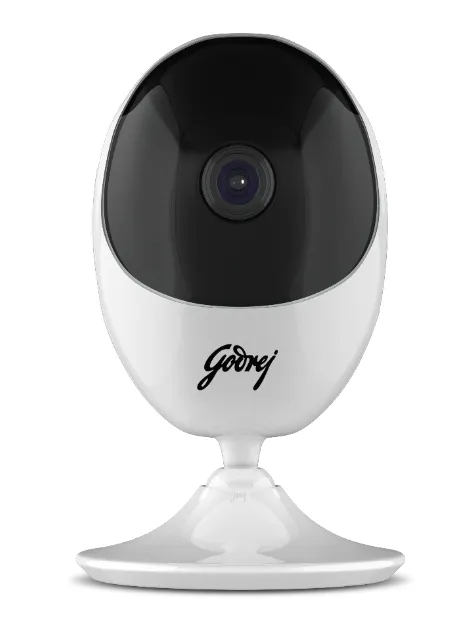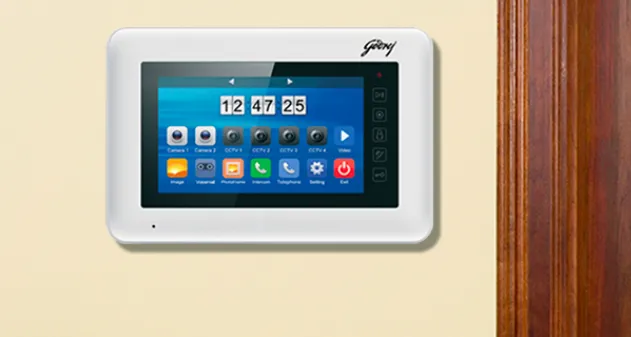How the Godrej Group is driving innovation in home security systems in India
Indians are averse to installing electronic security devices in their houses. Godrej, a brand synonymous with home security, is out to change that.
The Godrej Group has, for long, been associated with security. Indian homes down the ages have bought Godrej locks, almirahs, safes, and more, to protect their valuables. In the era of the internet — and the Internet of Things (IoT) — though, a conventional lock or a steel almirah might be inadequate.
Today, there are many complexities in the process of securing life and goods. Godrej Security Solutions (GSS), a division of the $5 billion Godrej Group, is out to address these complexities. It leverages technology to create innovative security products for homes, offices, and residential and commercial complexes.
At the core, though, GSS is trying to “change mindsets” and “shift paradigms”. Indians do not believe in putting cameras inside their homes because they do not think anything bad can happen to them, the company reveals. “It must be their neighbour whose house is getting burgled, but not theirs,” it says.
This observation is derived from GSS’ multiple consumer studies, and ethnographic research conducted across the country. And this is what it wants to correct by educating customers and simplifying products to such an extent that managing home security becomes as effortless as using a mobile phone.

Mehernosh Pithawalla, VP and Global Head of Godrej Security Solutions, tells YourStory,
“Home security is still nascent in India because there is a predominant mindset that ‘if my karma is good, nothing bad will happen to me’. Hence, people use extra doors, multiple locks and grill gates. At the most, a society or residential complex would have a CCTV camera installed. But, inside the house there is nothing.”
“There is also a perceived pain related to the installation of security gadgets inside the house. People think they are very complicated. They think even after installation, they may not be able to use it. So, the entire anxiety surrounding home security is a big barrier for us,” he adds.
Breaking barriers and changing mindsets
GSS is possibly the only large player in the domestic home security market, and is thus tasked with the responsibility of breaking perception barriers that plague the segment.
The company is developing products that are simple, intuitive, convenient, and relevant to the Indian household.
Mehernosh explains,
“We can't just get products from international markets and retro-fit it to India. Making things for daily life in India is crucial. We have invested a lot in understanding products which can fit in with the Indian lifestyle, and are as simple to use as a mobile phone.”
The two core products GSS has developed are DIY home security cameras and video door phones. Both products are WiFi-enabled and can be remotely controlled through separate mobile applications.
The company says it has sold 8,000-9,000 units of the WiFi-enabled security cameras, which were launched last October. The cameras retail under the ‘EVE’ (stands for Easy Viewing Everywhere) brand across electronics and appliances outlets, and hardware stores. GSS wants to sell at least a 100,000 units of EVE cameras by the end of the year.

Mehernosh says,
“These are OTC (over the counter) products and available at affordable price points. They are self-intuitive, you can install them on your own. You can ask for free technical assistance too. I see these picking up because of the speed at which WiFi connectivity is improving today.”
The EVE cameras come in four variants, and have a slew of features including motion control, night vision, and 24X7 recording. They can follow you in case of commotion, and also enable you to share the camera feed with your friends and family. You can talk into the camera as well. All controls can be managed through the EVE mobile app.
As for video door phones, pick-up has been slower as compared with cameras.
The device comprises an indoor unit with a monitor and an outdoor unit with an in-built microphone and camera that helps you identify and communicate with a visitor without having to open the door. Its two-way audio communication system allows conversation with the visitor. This can be done remotely as well if the occupant of the house is away.
Video door phones increase security, and help evade unwarranted visitors. But Indians are yet to warm up to it. Mehernosh says,
“Because it has substitutes like neighbours. People prefer to just tell their neighbours to go and check on their houses when they are away. And when they are at home, they would just use a normal peephole.”
Even those living in modern buildings prefer to stick to traditional ways of home security, he adds.
The video door phones are priced in the range of Rs 17,000 and Rs 20,000, while the DIY security cameras are available at Rs 5,000- Rs 10,000. The affordability quotient might also have played a part in the slow uptake of video door phones.

Design-led product innovation
GSS is continually innovating. More products in security and home automation are on their way. Without going into specifics, Mehernosh says, “The scope is increasing from a security device to a communication device.” The advent of IoT in the consumer and home automation space is leading to newer, smarter, more intelligent products.
As a result, home security is poised to become a $47.5 billion industry by 2020, according to research firm Markets & Markets. It states,
“A rise in the awareness levels among consumers and increased adoption of new technology for home security would gradually result in the cost reduction of the solution, thus driving the market further.”
GSS estimates that the overall residential security market in India is about Rs 500 crore to Rs 550 crore, but home security is “worth a few crores only and that is the big opportunity we have.”
A large part of the product innovation at GSS is done in-house. There is a strong focus on design research and design-led thinking that helps make products more simple and convenient.
The company employs designers and product engineers from reputed institutes like MIT, IIT, NID and more. “We do collaborate with some startups and design agencies occasionally. But the heart of the system is developed here,” Mehernosh says.
Customer education and competition
In order to educate customers about its products, GSS is setting up exclusive security zones across the country. The first one has come up in Chennai, and the response has been good. The company reveals that a lot of effort and investments are going into channel expansion, distribution, advertising, and customer education at the point-of-sale.
Sure, Godrej occupies over 80 percent of the home safes market in India. In the electronic home security space too, it has been the first-mover and is gaining a distinct advantage. But, global players are not far away. Amazon makes smart locks and security systems, which it can bring to India any time. Google has Nest outdoor cameras, and Xiaomi has a presence in the space too. And there will be more “opportunistic entries” as GSS says.
How does it gear up for competition then?
Mehernosh explains,
“We don’t look at them as competition at all. These are complementary devices. We can collaborate with them. In fact, we are already working with Amazon. Alexa is compatible with our home cameras. You can just ask Alexa to add your camera feed to the Echo Spot. There will be more such smart integrations going ahead. If they succeed, we will succeed too.”







